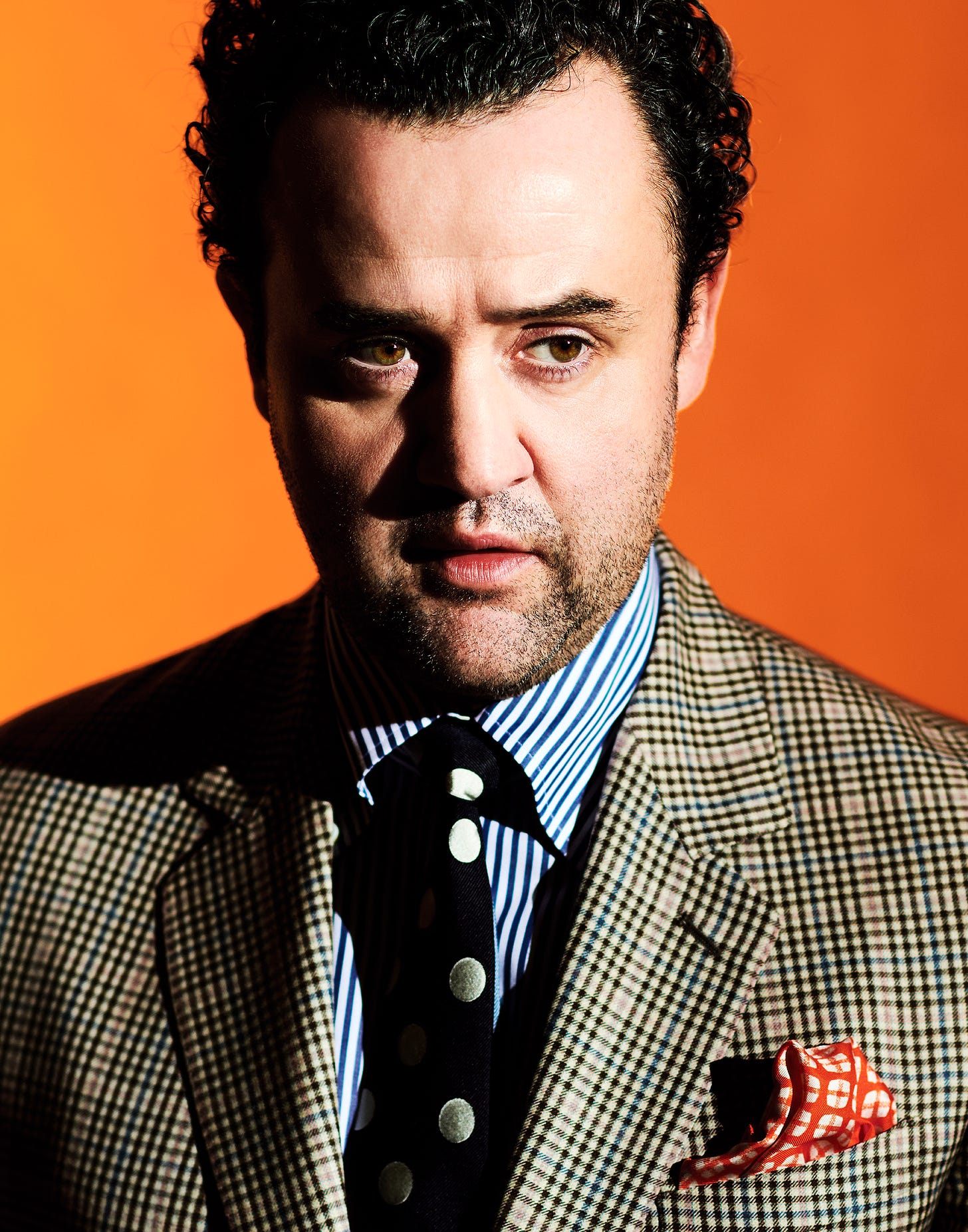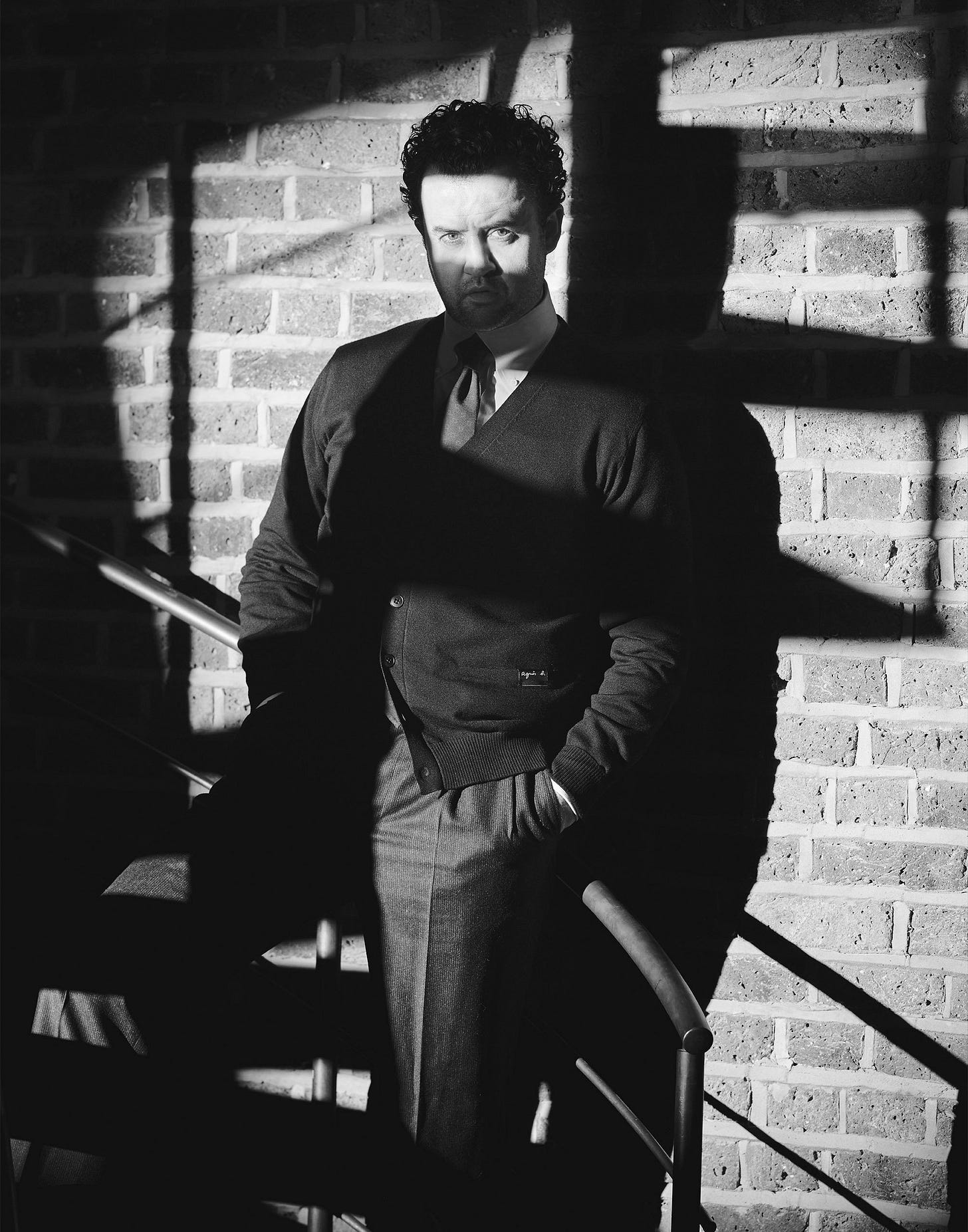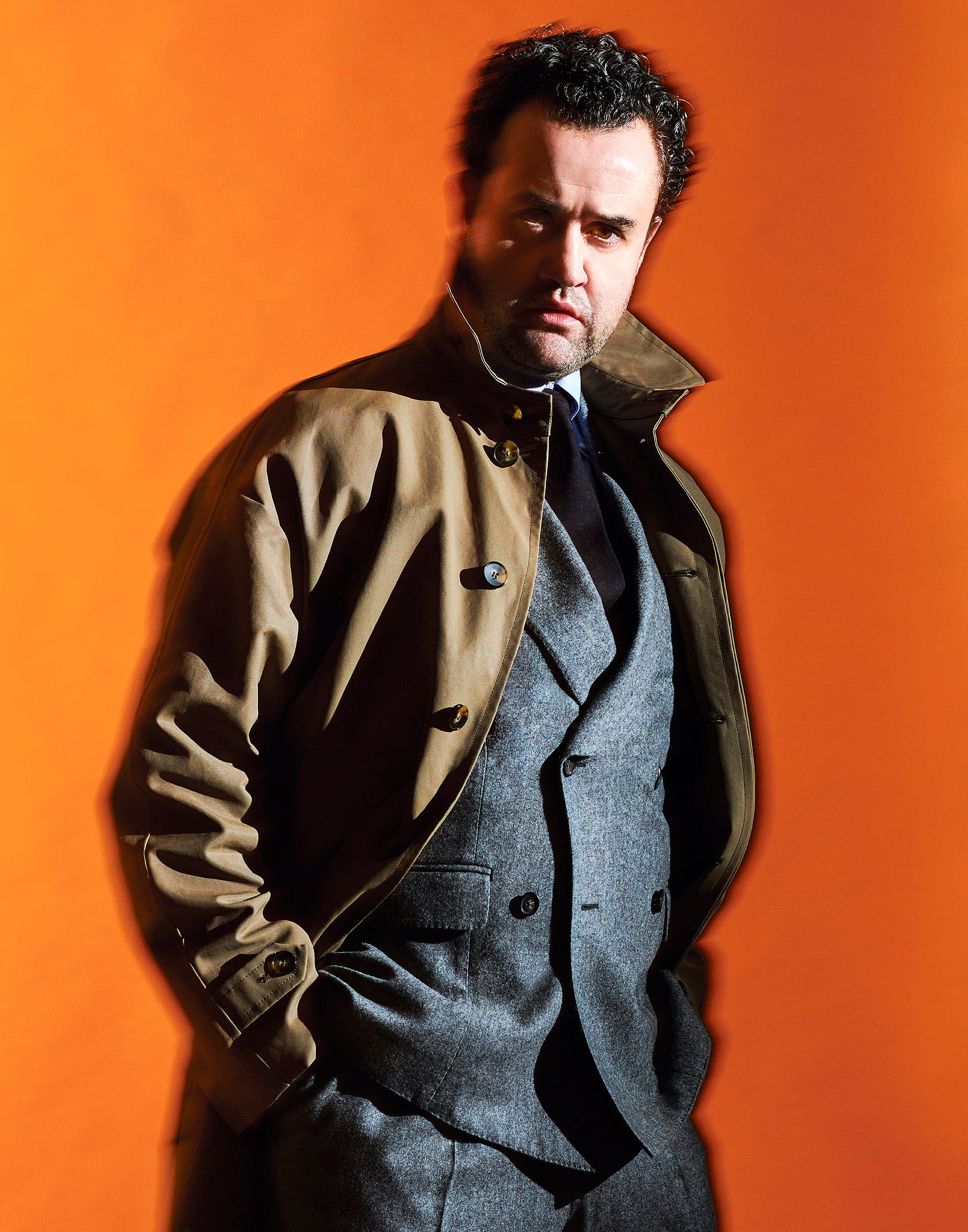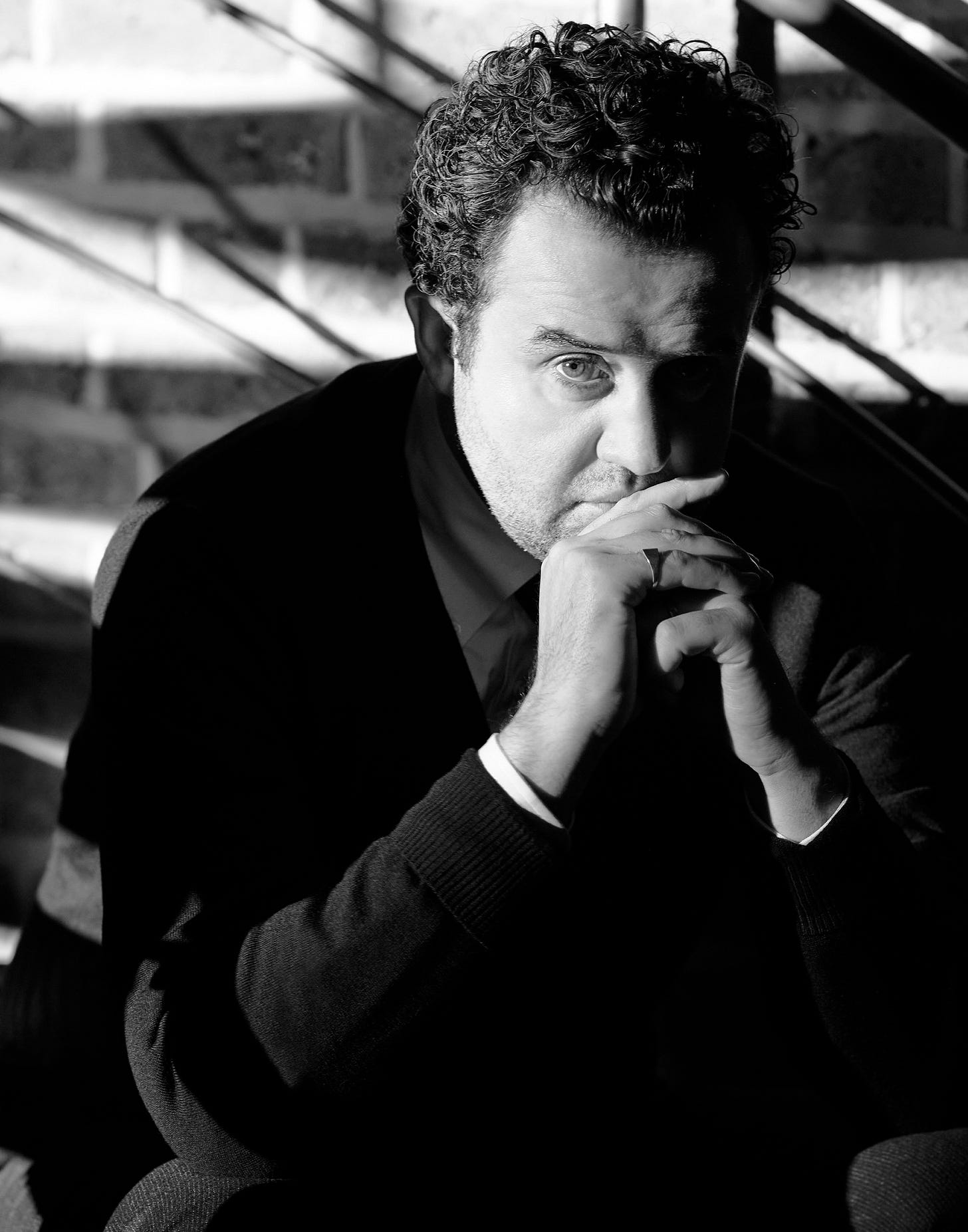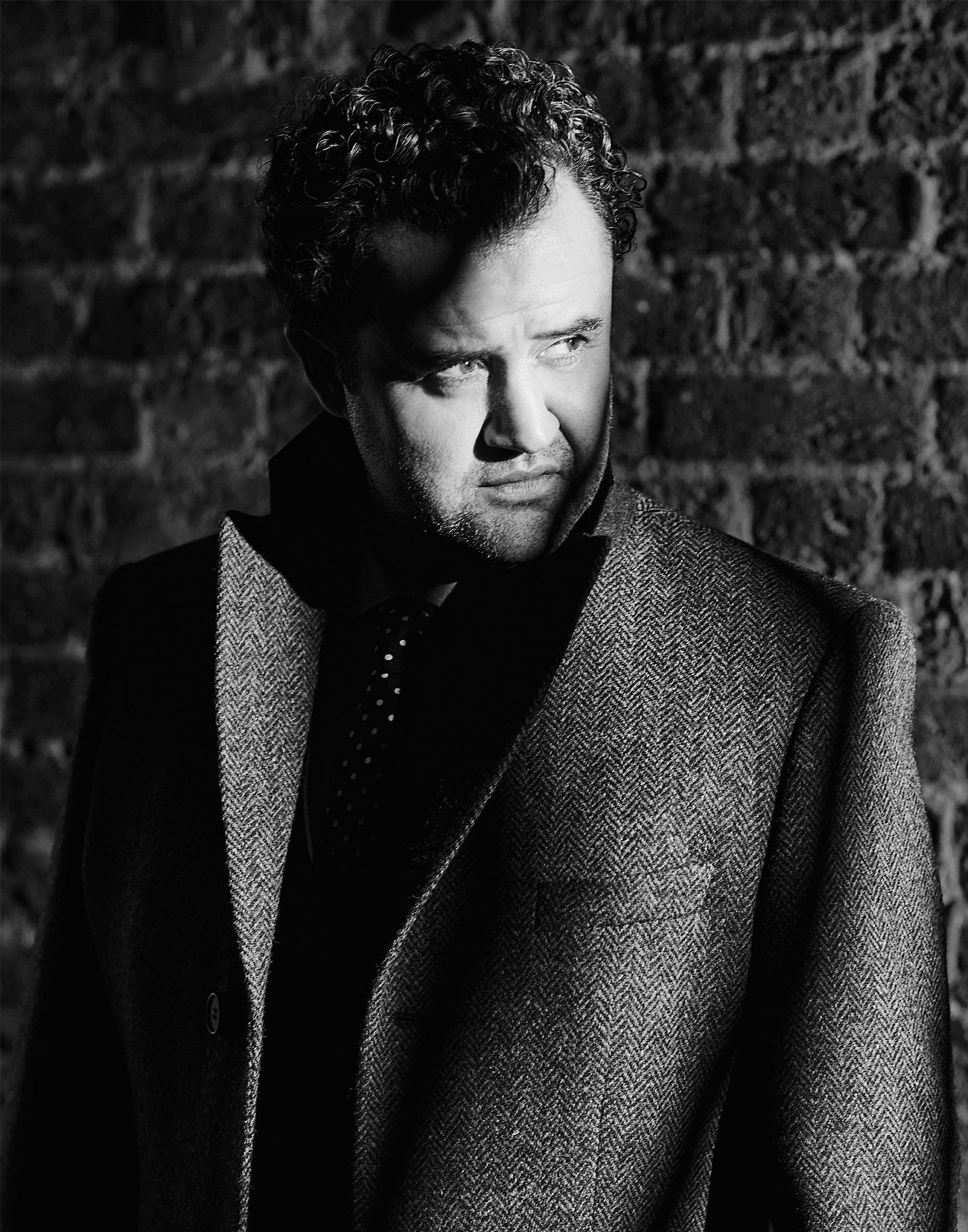Daniel Mays - All All or Nothing
Whilst many of his earlier roles could be said to be on the more serious, darker side, over the years Daniel Mays has come to combine those types of roles with more light-hearted, warmer characters.
Interview Philip Goodfellow
Photography Perry Curties
It may seem unlikely to anyone familiar with the actor’s oeuvre, but the earliest inspiration for Daniel Mays taking the career path he has came courtesy of the King of Pop. ‘Way back when, the first performance I ever saw that captivated me was Michael Jackson on the Bad tour. My mum took me along in 1988 and it was a definite light bulb moment. It was the dancing, the physicality of him. I locked myself in my bedroom with the black trilby hat and that became my party piece. Any school disco, if a Michael Jackson song came on, all my mates would form a circle and I’d do my moonwalk and all that stuff.’ One of four brothers growing up in Essex, it was unusual amongst his family to want to perform, though his parents were wholly supportive and signed Daniel up to a local dance school, which led on to enrolment at Italia Conti. Initially, Daniel’s focus was on musical theatre but, as tends to happen during teenage years, his interests began to change and a burgeoning fondness for independent American cinema drew him towards acting. An afternoon spent bunking off from ballet to see Pulp Fiction in Leicester Square sealed it for him. ‘No more tits and teeth,’ as he puts it.
Attendance at Italia Conti led to a successful audition at RADA but, whilst the pathway is a natural one for anyone looking to carve out a career as an actor, RADA proved to be a stark change. ‘I didn’t take to it well initially. It was very different from stage school; my classmates had been to university and were all really well read, they could talk until the cows came home about what acting is. I felt very self-conscious and shy at the beginning, but then I thought “What are you doing? You can’t be like this”. I was always very aware I was walking into RADA, every day I went there; I recognised it was a great opportunity, that it was a privilege to get a place there, so I just started stripping the walls of information. In the end, it’s all about getting in the space and freeing up your inhibitions. I always believed that whatever talent you have, that’s the thing that gets you through the door at drama school; the talent never leaves you. What they do is give you the techniques and tools to hone that talent and unlock the gift, if you want to call it that, or the desire to act that you have. In drama school, everything just opened up for me. It was incredible.’
As enriching and fulfilling as RADA had been, it was back down to earth with a bump following graduation. With no work coming in for six months, Daniel took a job at a casting agency filming auditions for extras. Having initially signed himself up with a smaller agent, he was soon approached by Sarah Spear who at the time was working at London Management. Daniel turned to Nicholas Barter, his principal at RADA, for some guidance. ‘Nick said to me “Stick to your guns, go with your decision and stay with the smaller agent,” and I went “You’re absolutely right”.’ I got out of the office, picked up the phone and immediately went with the bigger agent. I just thought, I might as well go for it.’ Now at Curtis Brown, Sarah Spear remains his agent to this day.
Work eventually started to trickle in and a handful of episodes on TV soap Eastenders were followed by a small part in the film Pearl Harbor, Daniel’s character credited as Pilot #3. ‘It was kind of extraordinary to be on that set. I had a scene with Ben Affleck, it was in this kind of pub setting, and just before we started to turn over it began to rain. I had like three lines in this group scene, we were really struggling with the rain, and of course it never made the final cut. That was the only real bit of acting I had in it and immediately I ended up on the cutting room floor, but nevertheless it was an amazing experience to be on that set.’ Though his experience to that point was still limited, Daniel quickly came to the valuable realisation that progressing his career was all about networking and forming relationships, particularly with casting directors. One such relationship, with Nina Gold, would prove to be a game changer when the revered casting director put Daniel forward for a part in the Mike Leigh film All or Nothing, the story of three working-class families in present day London. ‘I had to go and meet him in his office on Greek Street, just an initial chat, then I got called back. Then you do that infamous improvisation for him where you don’t speak, you just kind of exist. It came my way and I was the last actor he started rehearsals with. It felt like everything I had learnt up until that point just went out the window; a year out of drama school, there I was working one-on-one with arguably one of the greatest directors this country has ever produced. You’d hear horror stories about actors and Mike Leigh where they rehearsed for six months and only had one line or they don’t even end up in the movie, so I was quite gung-ho. It’s like life and death when you first start out and I thought “I’m going to throw the kitchen sink at it”. I was lucky that he responded to what I was giving him and out of that came this horrendous character Jason. I had eight or nine meaty scenes, really good scenes, and he was hopefully a memorable character. It’s a beautiful film that.’ Any doubts Daniel might have had regarding whether he’d done a good job were quickly dispelled by Mike Leigh himself. ‘I remember him standing next to me on set and he said, “That’s a wrap for Danny on All or Nothing,” and I got a lovely round of applause, then he leant over and just whispered in my ear, “See you on the next one”. I was like, “That sounds pretty good”. And of course, the next one was Vera Drake.’
Despite working with the same director and some of the same cast and crew, Vera Drake would prove to be a very different experience to All or Nothing, in terms of both production and success. Set in the East End of London in the fifties, the film tells the story of an unassuming working-class woman, portrayed brilliantly by Imelda Staunton, who secretly performs illegal abortions. For Daniel, who plays Vera’s son Sid, the film would prove to be a major turning point. ‘It was a hard film in terms of preparing for it, the importance of the research. All or Nothing was a lot easier because it was contemporary, everything was around you, whereas on Vera Drake you were having to improvise and the work you’d poured into the research had to be there at the forefront of your mind.’ As if accurately capturing the essence of London in the fifties didn’t present enough of a challenge, there was also the long, arduous process of working with Mike Leigh, individually at first before gradually being introduced to the other characters, all the while only knowing as much as his own character knew. ‘I do remember having a bit of a moment, because I had such a strong narrative with All or Nothing but here, I was literally just improvising in this family in the fifties. I said to Mike, “I’m not going to be in the film, am I? Nothing’s happened”. He said, “Just trust me, go with it”. Then of course, we get into character one day, really early, and we’re improvising the engagement of Alex Kelly’s character, Sid’s sister, who marries Eddie Marsan’s character. You never come out of character until Mike tells you to or until one of his assistants does. So, we’re cooking food and getting ready, we’re all dolled up, the relations come round and we’re sitting there in this rehearsal flat in Crouch End, having been in character for about three hours. Suddenly, bang bang bang, there’s this knock at the door. The actor antenna goes up; I’m thinking, “All of the actors I’ve rehearsed with are sat around this table, who on earth can that be?” There’s another knock, Phil Davis goes to the door and in pile all these police. Unbeknownst to any of us, there was a whole other wing to this disused hospital we were rehearsing in that we never even knew existed. Imelda was dragged away, interrogated all night - it went on for about 12, 13 hours this improvisation. It was like being hypnotised, like this bomb had been let off. Then Phil came back, sat down and said, “Your mum’s been helping young girls out”. I remember I had like this physical sensation of my stomach falling away. Then you come out of it, you talk about it with Mike, and what that does is, all the emotional, physical, psychological impact it had on you, you apply all of that into the improvisations, which eventually become the script. You never improvise on camera – that’s the myth that everyone thinks happens, but that’s not the case. It’s very meticulous, very detailed and all entrenched in the character work that you’ve done over months and months.’
For Daniel, working with Mike Leigh on those two films in quick succession at such a formative stage of his career felt like vindication for wanting to become an actor in the first place, so artistically rewarding was the experience. ‘I thought, “If films are going to be this good, the world’s my oyster”. He doesn’t just treat you like an actor who’s shown up for the day, who’s learned his lines and is just there to get the scenes done. It is such a unique process and once you understand how much it takes out of Mike, you realise then why a lot of actors reappear in his films.’
The subsequent success of Vera Drake substantially increased Daniel’s profile and the last two decades have seen him establish himself as a go to character actor for both television and film. Despite the increased freedom to choose what he works on, he has shown he has a keen eye for a project worth taking a risk on, such as the 2008 independent British film Shifty. Shot on a shoestring budget, the film tells the story of a fraught relationship between two friends, Chris (Daniel’s character) and Shifty, played by Riz Ahmed. The film is a shining example that strong writing and committed performances can often overcome considerable financial restraints and it’s a project Daniel is clearly proud of, with good reason. ‘Shifty really was an important movie in a way. It was such a success story. My agent was like, “Darling, there’s no money in it, it’s a micro-budget”; I think she was persuading me not to go for it because she wasn’t sure, but it’s such a brilliant script from Eran Creevy. To me, it had such depth; it was so rich in terms of the relationship between the two characters. There were a lot of other urban London films going on at that time like the Kidulthood series, which was fantastic, but to me it was all about the dynamic between the two best friends. They were broken and it was all about them reconnecting. I didn’t know Riz or Eran at the time, or Ben Pugh the producer. It was a fantastic role on the page, then I met Eran and we got on like a house on fire. That’s what it is, you meet these people and you think “Yeah”. I had such a connection with Riz. We spoke a lot, we grounded the characters, so to me it was more a Mike Leigh/Ken Loach type movie than a sort of urban thriller type of thing. The great thing about the movie is that the violence only really happens towards the end; it’s the foreboding that gets you to that point. There was so much unsaid between the characters, that’s what was really interesting.’
Whilst many of his earlier roles could be said to be on the more serious, darker side, over the years Daniel has come to combine those types of roles with more light-hearted, warmer characters. ‘I’ve always felt just as comfortable with comedy as with the serious stuff, but it was maybe a need for me to go in a different direction and lighten things up, have a bit of both.’ That more comedic side was brought into play for his latest film, Your Christmas or Mine?, streaming now on Amazon Prime. ‘A lot of the work nowadays is straight offers, which is incredibly flattering; that’s never lost on me. This was a straight offer and I sat down and read it – it’s Tom Parry’s first ever script – and within the first five pages I was like, “I’m completely in”. The premise is about two aspiring drama students who are just falling in love, they jump on each other’s trains and this snowstorm happens, so they end up spending their Christmas at each other’s family homes. It reminded me slightly of Sliding Doors, that kind of film. It’s a really wholesome family film and, above all else, it was the character and how funny his dialogue is. I’ve been involved in that kind of movie - Fisherman’s Friend springs to mind - that kind of feel-good movie, it’s a really difficult genre to get right. You have to fully, whole-heartedly commit to it and we definitely did that with Your Christmas or Mine?, it really does punch above its weight. I think the inspiration was, when’s the last great Christmas movie you’ve seen? It hopefully does that. It is an absolute treat.’
At the time of speaking to us, Daniel is on a flying visit back to London, having been busy working on a lavish new production for Apple TV being filmed on location in France about Benjamin Franklin’s time spent there in the 18th century. Appearing alongside his good friend Eddie Marsan and Hollywood royalty Michael Douglas, who plays Franklin, Daniel has put on some weight for the role in keeping with the physique of his character, one more example of his willingness to throw himself into his work. The role itself is also another example of his standing as an actor and, given all he has achieved already throughout his career, he would be forgiven for feeling that his feet are well and truly under the table and he is now a fully-fledged member of the British acting establishment. That isn’t necessarily how he views things though. ‘To a certain extent, I probably feel like I’m still out there on my own a little bit. I don’t try to second-guess it though. It’s a difficult thing to categorise or get your head around really. Things you think are going to be great don’t quite land and vice versa; you just have to turn up and do everything you can to make the character work and whether it’s a success or not is kind of out of your hands. It’s a question of why you keep doing what you do ; you have to pay the bills, the mortgage and all that stuff, but I always get really inspired when I see great work from other actors, because it feels like they’re raising the bar and in a way that galvanises you as well to continue to be as creative and entertaining as you can for people to watch. Stephen Graham is a great mate of mine, people like Eddie Marsan and Sally Hawkins, actors of our generation, I’m always hugely proud when I see how good their work is. I’ve never really had a game plan, I’m not one of those actors who goes “Right, in five years I’m going to be here”; the industry doesn’t work like that. Actors can talk about their career but, in a way, there’s sort of no such thing. It is what it is. The breaks come your way or they don’t. I’ve been lucky that I’ve had a great agent who’s been there every step of the way with me, a supportive wife and everything else.’
Stylist - Tanja Martin
Grooming - Michael Gray at David Artists
Retouching - Rob Crane at Makular




